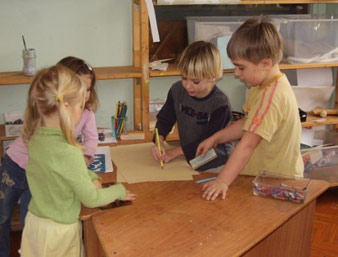
Virtual Interview with Teachers and Administrators of Different Russian Preschools
Through the answers to different questions, important for the field of early childhood education, the reader can learn how preschool teachers and administrators see daily routines of their schools, how they react to numerous innovations, how they describe most favorable for children’s development conditions and activities and how they characterize a possible reform.
Vital Skills for a Modern Preschool Educator
In this article, Dr. Klarina lays out a thorough plan of action for teachers to use in solving their little or large educational problems that they face in their school setting on a daily basis. Employing an anthropological approach to problem solving that is holistic in its scope, Dr. Klarina provides a valuable outline for use in educational planning with a stress on reflection at all stages of the process. Her list of necessary skills and her perception of the role of the teacher as an educational leader are critical tools for any teacher preparing to begin an educational problem solving activity.
Developing Subjection of Kindergarteners by Introducing Them to Russian Nature and Culture
In this article, the authors present the design and results of an experimental project which allowed them to explore the conditions of the kindergarteners’ subjectivity development. The project was based on the Subject’s Activity Model as developed by Dr. Lyubov Klarina, and it helped to raise children’s interest in Russian nature and culture, contributing to the development of their civic and cultural identity.
The Creation of a “Child and Parent Club” as a Precondition for Developing a “Family and Educator ‘Shared Interest Group’” at Moscow Preschool No. 690
The authors describe in this article their efforts to face the universal problem of family and school cooperation by finding a way to nurture a strong family and school “obshnost” (For the purposes of this article, this Russian word which means “a commonality or community” will be translated as “shared interest group” or “S.I.G.”). Using a scientific and anthropological approach to problem solving, they define a possible solution, identify the target group, design a plan, implement it, and reflect on its operation and consequences. Included in the addenda to this article are samples of actual meetings of the “child and parent club” that was created as a solution to the original problem.
Preschool Education: Voices from Perm Preschool Teachers, Administrators and Municipal Leaders
This section of the journal presents both answers to some questions of the virtual interview and thoughts about preschool education, submitted by different representatives of the city of Perm – Ludmilla A. Gadzhieva, head of the Perm department of education, Tatyana P. Dvorak, head of the municipal administration for strategic planning, and Olga S. Ershova, leading specialist from the Perm department of education, principals and teachers from Preschools #49, 55, 77, 175, 195, 233, 268, 298, 358, 390, 415, and also by the organizers of a new private preschool “Town of Childhood.” The editorial board hopes that these materials will raise your interest and inspire your comments and replies, which we always look forward to.
“A Town of Childhood” as a Step to Establish Cooperation Between Russian and American Systems of Preschool Education
The authors present an innovative model of a preschool which serves as an example of true cooperation between a university college and its students. This is an attempt to create favorable conditions for both young parents and their children – for the first – to successfully study and for the second – to fully develop at a preschool stage. This is also an example of a mutually enriching cooperation between Russian and American colleagues.
Small School – Big Opportunity
The article introduces the programs and philosophy of the Virginia Beach Friends School, an independent Quaker school. The author describes the criteria that the school is using when considering placement. A detailed description of a Cottage and a Pre-K program is given. The article also presents a concept of an Early School curriculum and the freedom for children to explore academic subjects.





